Synthesis Reactions
Synthesis reactions, also known as combination reactions, are chemical reactions in which two or more simple substances combine to form a more complex product. The general form of a synthesis reaction can be represented as:
A + B → AB
Where A and B are the reactants and AB is the product.
Examples of Synthesis Reactions:
1. Combination of iron and sulfur to form iron(II) sulfide:
Fe + S → FeS
2. Combination of hydrogen and oxygen to form water:
2H2 + O2 → 2H2O
3. Combination of carbon and oxygen to form carbon dioxide:
C + O2 → CO2
Study Guide:
- Understand the general form of a synthesis reaction: A + B → AB
- Be able to identify synthesis reactions from chemical equations
- Memorize common examples of synthesis reactions, such as the formation of water and carbon dioxide
- Practice balancing synthesis reactions to ensure conservation of mass
- Understand the role of energy in synthesis reactions, as some may require energy input to occur
Understanding synthesis reactions is important in understanding how different elements and compounds can combine to form new substances. It is also crucial in fields such as chemistry, biochemistry, and material science.
.◂Science Worksheets and Study Guides Eighth Grade. Organic compounds
Study Guide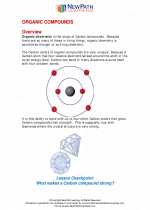 Organic compounds
Organic compounds  Worksheet/Answer key
Worksheet/Answer key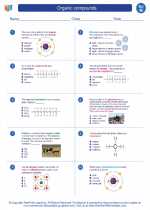 Organic compounds
Organic compounds  Worksheet/Answer key
Worksheet/Answer key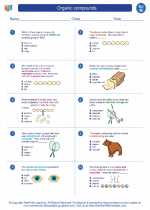 Organic compounds
Organic compounds  Worksheet/Answer key
Worksheet/Answer key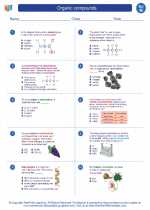 Organic compounds
Organic compounds  Vocabulary/Answer key
Vocabulary/Answer key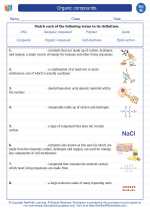 Organic compounds
Organic compounds  Vocabulary/Answer key
Vocabulary/Answer key Organic compounds
Organic compounds 

 Worksheet/Answer key
Worksheet/Answer key
 Worksheet/Answer key
Worksheet/Answer key
 Worksheet/Answer key
Worksheet/Answer key
 Vocabulary/Answer key
Vocabulary/Answer key
 Vocabulary/Answer key
Vocabulary/Answer key

The resources above cover the following skills:
Physics: Students will use scientific skills and processes to explain the interactions of matter and energy and the energy transformations that occur.
Thermodynamics: Identify and explain that heat energy is a product of the conversion of one form of energy to another.
Identify and describe the various forms of energy that are transformed in order for systems (living and non-living) to operate: Chemical - Flashlight-Light; Mechanical - Pulleys-Motion; Solar/Radiant - Solar calculator; Chemical - Plant cells.